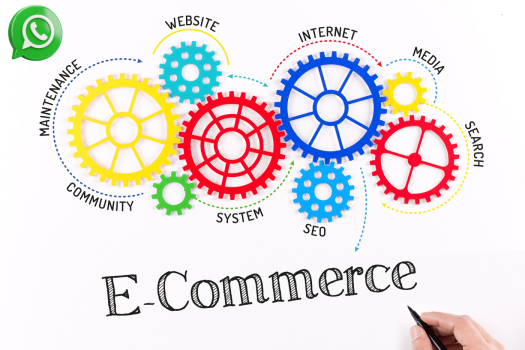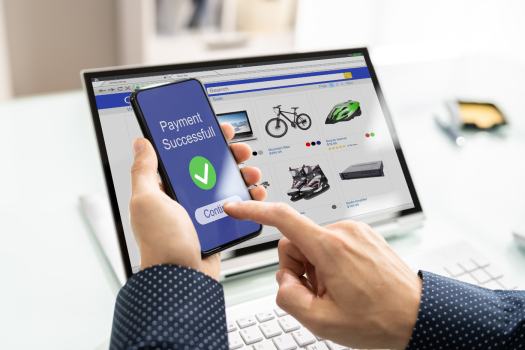BLOG'S
Table of Contents
Published on: April 30, 2025 11:29 AM
Master WhatsApp Ecommerce: Best Practices and Strategies

Introduction
In today's digital world, convenience to the customer reigns supreme. As companies find ways to decrease friction in purchasing, WhatsApp is quickly becoming an attractive channel. With more than 2 billion users globally, it's not surprising that WhatsApp ecommerce is expanding at a rapid clip—particularly in developing markets such as India.
Not only are businesses conversing with consumers, but they're actually selling directly over chat with WhatsApp e-commerce stores, catalogs and automation tools. With this ebook, you will be able to dominate WhatsApp for ecommerce, complete with winning tips, advantages and top strategies to leverage this popular app into a high-conversion selling machine.
The Growing Role of WhatsApp for Ecommerce
RCS messaging full form is Rich Communication Services and it's usually referred to as next-generation SMS. In contrast to regular SMS, which is restricted to text as well as simple images, RCS can enable companies to transmit rich media like images, videos, carousels, maps, and so on — all within the messaging environment. This technology enriches brand messaging by giving dynamic content and providing a more interactive user experience.
- Create live, personal connections
- Provide customer support in real-time
- Advertise offers through Shopping WhatsApp status
- Post product videos to educate and convert customers
Essentially, WhatsApp ecommerce closes the gap between conversation and conversion. Contrast this with conventional websites: customers don't need to go through convoluted menus—they ask questions, browse products and make purchases in a single fluid motion.
Advantages of Employing WhatsApp for Ecommerce
Here's why WhatsApp marketing for ecommerce is catching on in industries worldwide:
Real-Time Communication
WhatsApp enables companies to communicate with customers in real-time, answer queries and dispel doubts instantly, creating fewer obstacles to buy.
Increased Engagement
WhatsApp open rates are far greater than those of emails or SMS. If customers get product updates or custom offers, there is a high chance that they will act.

Interactive Product Displays
Businesses can present their inventory in a mobile-optimized design, like an online store but within the chat app, with the WhatsApp product catalog.
Simple Lead Nurturing
Want to learn how to turn leads into sales? With WhatsApp, it's easy—send timely follow-ups, promotional messages, or restock alerts to remain top of mind.
Thanks & Regards
Affordable Sales Channel
In contrast to developing a mobile app or website, establishing a WhatsApp store app is less expensive and quicker to deploy, making it perfect for small and mid-sized businesses.
How to Set Up a WhatsApp Ecommerce Store?
Ready to build your own WhatsApp e-commerce stores? Here are the steps to follow:
1. Turn Your WhatsApp into a Business Account
Begin by downloading WhatsApp Business from your app store. Next, follow the instructions for WhatsApp convert to business account, which include:
- Verifying your phone number
- Setting your business name, description, hours and location
- Creating an auto-reply greeting message
2. Build Your WhatsApp Product Catalog
Your WhatsApp business product catalog is your online store. Here's how to create it:
- Go to Business Tools → Catalog
- Tap "Add Product or Service"
- Upload images, product name, price, description and links
Once you've added it, you can share your WhatsApp catalog directly in chats and customers can easily browse your products.
3. Use a WhatsApp Store App
For bigger inventories or complex setups, third-party solutions such as Bikayi, Interakt, or WATI provide a full WhatsApp store setup with inventory management, payment integration and automation.
Best Tactics to Master WhatsApp Ecommerce
Stay ahead of the curve by implementing these expert tactics for long-term success:
1. Personalize the Buyer Journey
Segment your buyers and send targeted messages. Leverage buyer names, purchase history and behavior-based automation to enhance engagement.
2. Use Media-Rich Content
Increase your conversions with compelling media. Interested in selling videos through WhatsApp? Just share tutorial, testimonial, or product demo videos in chat or status. Customers relate more with images.

3. Utilize Shopping Status Updates
Share offers, new products and highlighted products on Shopping WhatsApp status on a daily basis. This option functions similar to Instagram Stories but with more personal engagement because of WhatsApp's intimate nature.
4. Make Click-to-WhatsApp Ads Enabled
Use Facebook and Instagram ads with "Send Message" CTAs that directly lead to your WhatsApp chat. This is one of the most effective business WhatsApp tools to get leads immediately.
5. Use Automated Follow-ups
After a customer interacts, use automation for cart reminders, feedback requests, or restock alerts. A WhatsApp selling app with CRM integration can assist you in this easily.
6. Highlight Products Through Broadcast Lists
Send offers exclusive or new products to broadcast lists by customer interests or purchase behavior. Always obtain opt-in in order to stay compliant.
7. Provide a Seamless Check-Out Experience
Collect payments through UPI, payment links, or third-party integrations without sending users away from WhatsApp.
Best Practices for WhatsApp Business Marketing
If you're serious about taking your WhatsApp ecommerce presence to scale, these best practices will help ensure you grow both ethically and sustainably:
Get Customer Consent
Always seek opt-in before sending marketing messages. This trusts and prevents spam complaints.
Reply Instantly
WhatsApp is an impatient platform. Delayed reply lessens prospects for conversion. Employ chatbots or pre-structured replies to maintain timely interaction.

Monitor Metrics
Employ statistics tools to follow up on open rates, click-throughs, response times and sales on WhatsApp. Adapt campaigns based on what works.
Provide Value
Don't merely sell—inform, educate, and entertain. Post useful content, buying guides, and tips in addition to your product offers.
Be Consistent with Branding
Utilize a branded profile picture, logo and catalog design. Use the same tone and style in all WhatsApp messages.
A Few Examples of WhatsApp Ecommerce Success
Boutique Clothing Brand (India)
A Delhi-based boutique employs WhatsApp business in India to display new arrivals every Friday through Shopping WhatsApp status. Orders are placed over chat and UPI links are used for payments. With very little investment in technology, the brand doubled monthly sales.
Mobile Accessories Retailer
This company merged a WhatsApp selling application with Shopify to automate inventory syncing. Product inquiries, purchase updates, and cart reminders are all automatic—increasing conversions by 40%.
Home Bakery Business
The bakery developed a WhatsApp product catalog with cakes and desserts. Customers shop, order, and arrange deliveries—all on WhatsApp.
Challenges and How to Overcome Them
Despite WhatsApp ecommerce being rich in opportunities, challenges also exist:
- Limited Design Options: Customizing layout is not possible like websites. Rely on quality images and concise product descriptions.
- Scalability: Handling hundreds of chats may be difficult. Leverage chatbots and CRM integrations to simplify.
- Policy Compliance: Never spam. Always abide by WhatsApp's messaging and commerce policies.
Conclusion: The Future of WhatsApp Ecommerce
As e-commerce continues to change, so do customer expectations. Customers want instant communication, speedy resolutions, and frictionless buying experiences. WhatsApp ecommerce provides all this—and more.
From WhatsApp business product catalog setups to WhatsApp store apps and automated lead nurturing, there’s no shortage of tools to help your brand grow. The secret lies in mastering both strategy and execution—engaging customers with authenticity while optimizing for conversions.
So whether you’re just starting with WhatsApp for business marketing or looking to scale your existing WhatsApp e-commerce stores, now is the time to go all in.